- What is a qualified electronic signature?
- How does a sworn translation with an e-signature work?
- Why choose a digital signature for certified translations?
Tłumaczenia przysięgłe wymagają uwierzytelnienia przez upoważnionego do tego specjalistę, który został wpisany na listę tłumaczy przysięgłych. I choć w większości przypadków takie uwierzytelnienie odbSworn translations must be officially certified by a court-authorised translator listed in the national register. Traditionally, this involves a physical stamp and handwritten signature, but in recent years, qualified electronic signatures have become a convenient and legally accepted alternative. What does this mean in practice, and is it the right solution for you?
What is a qualified electronic signature?
A qualified electronic signature is a secure type of digital signature with full legal validity – just like a handwritten signature. It is issued based on a qualified certificate and can be used to sign official documents, including certified translations.
Thanks to this certification, the signature confirms both the authenticity of the signer and the integrity of the file. It can be verified by government institutions, courts, and other official bodies.
How does a sworn translation with an e-signature work?
The process is simple. You send the source document electronically to a sworn translator who is authorised to use a qualified electronic signature. Once the translation is complete, the translator certifies it digitally and sends the signed file back to you.
The result? A fully legally binding document that you can submit to offices, courts or other institutions – without needing a paper version.
Why choose a digital signature for certified translations?
Using a qualified e-signature brings several benefits for both the client and the translator:
- Faster turnaround – documents can be sent, translated and certified entirely online, cutting out postal delays and unnecessary admin.
- Convenience – there’s no need to leave your home or office. The entire process takes place remotely.
- Full legal validity – translations signed electronically are legally equivalent to those certified on paper.
- Security – the file cannot be changed after it’s signed. This ensures the content remains intact and tamper-proof.
- Lower costs – there’s no need to print, scan, or mail physical documents, which saves time and money.
When should you request a translation with a digital signature?
This service is ideal for both personal and professional documents, such as:
- Birth, marriage, and death certificates
- Academic diplomas and attestations
- Powers of attorney and declarations
- Business contracts and official correspondence
- Company registrations and international agreements
Looking for fast, certified, and secure translations?
At OMERO, we offer certified translations with digital signatures that are fast, fully compliant, and legally recognised. If you need a secure and convenient solution, don’t hesitate to contact us – we’re here to help.
